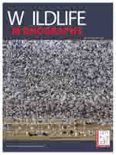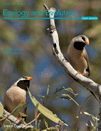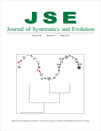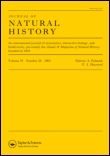
Nature Ecology & Evolution
Scope & Guideline
Exploring the intricate web of life through cutting-edge research.
Introduction
Aims and Scopes
- Ecological Dynamics and Ecosystem Functioning:
Research focused on understanding the interactions within ecosystems and how these dynamics influence overall ecosystem health and functionality. - Evolutionary Mechanisms and Processes:
Studies that explore the mechanisms driving evolutionary change, including genetic, environmental, and ecological factors. - Conservation and Biodiversity:
Contributions that address biodiversity conservation strategies, the impacts of human activities on ecosystems, and frameworks for sustainable management of natural resources. - Microbial Ecology and Evolution:
Investigations into the evolution and ecological roles of microorganisms, emphasizing their contributions to ecosystem processes and health. - Anthropogenic Influences on Natural Systems:
Research examining the effects of human activities, such as climate change, habitat destruction, and pollution, on ecological and evolutionary processes. - Indigenous Knowledge and Ecology:
Studies integrating traditional ecological knowledge with contemporary ecological research to address conservation challenges and promote biodiversity.
Trending and Emerging
- Climate Change and Its Impacts:
A growing body of work focuses on the effects of climate change on biodiversity, ecosystem services, and species interactions, emphasizing the urgent need for adaptive management strategies. - Genomic and Evolutionary Genomics:
Research that employs genomic tools to understand evolutionary processes is on the rise, highlighting the genetic basis of adaptation and speciation. - Human-Wildlife Interactions:
Studies examining the complex interactions between human activities and wildlife are increasingly common, addressing conservation challenges in urban and rural contexts. - Microbiome Research and Ecology:
The role of microbiomes in ecological interactions and their evolutionary implications is emerging as a significant area of interest, reflecting the interconnectedness of life. - Indigenous and Local Knowledge in Conservation:
There is a notable trend towards integrating Indigenous and local knowledge systems into ecological research and conservation practices, recognizing their value in biodiversity preservation. - Ecosystem Restoration and Management:
Research focusing on strategies for restoring degraded ecosystems and managing them sustainably is gaining traction, driven by the need for effective conservation solutions.
Declining or Waning
- Traditional Taxonomy:
Research focused solely on classical taxonomic classifications has become less prominent, as interdisciplinary approaches and genetic methods gain importance. - Single Species Studies:
There is a noticeable decline in studies dedicated to single species without considering their ecological interactions, as broader ecosystem and community-level analyses are favored. - Static Models of Ecosystem Dynamics:
Research utilizing static models that do not account for temporal changes in ecosystems has decreased, with a growing preference for dynamic, adaptive models. - Descriptive Studies of Biodiversity:
Purely descriptive studies that catalog biodiversity without examining underlying ecological or evolutionary processes are becoming less common. - Local Case Studies:
While valuable, the focus on localized case studies without broader implications or connections to global trends is waning in favor of more integrative, large-scale approaches.
Similar Journals

OIKOS
Unveiling the complexities of ecology and evolutionary science.OIKOS is a leading journal dedicated to the field of Ecology, Evolution, Behavior, and Systematics, published by WILEY in the United Kingdom. Since its inception in 1973, OIKOS has established itself as a vital platform for researchers seeking to advance their understanding of ecological interactions and evolutionary processes, with its impact reflected in its prestigious Q1 classification in the 2023 Scopus rankings. The journal's dedication to high-quality research is exemplified by its robust ranking of #106 out of 721 in the relevant categories, situating it within the top 15% of journals globally. With a commitment to disseminating influential findings, OIKOS encourages the open exchange of ideas among a diverse range of scholars, making it an essential resource for academics, professionals, and students alike. Whether you are interested in innovative ecological theories or applied research with real-world implications, OIKOS provides a rich repository of knowledge to inform and inspire your work.

WILDLIFE MONOGRAPHS
Connecting theory and practice in ecological sciences.WILDLIFE MONOGRAPHS, published by WILEY, is a prestigious journal dedicated to advancing the understanding of ecological and biological sciences with a keen focus on wildlife conservation and management. With an ISSN of 0084-0173 and an E-ISSN of 1938-5455, this journal has established itself as a leader in its field, ranking in the Q1 quartile for both Ecology, Evolution, Behavior and Systematics and Nature and Landscape Conservation in 2023. The journal's remarkable impact is underscored by its Scopus rankings—46th out of 721 in Agricultural and Biological Sciences and 17th out of 211 in Environmental Science, highlighting the journal's influential role in shaping research discussions and policy in wildlife management. Available in print and online, WILDLIFE MONOGRAPHS publishes comprehensive studies that inform practitioners, researchers, and students alike, fostering a deeper insight into biodiversity and ecosystem dynamics. Founded in 1981, the journal continues to evolve, contributing significantly to the scientific community through rigorous peer-reviewed articles that bridge the gap between theory and practical application in wildlife management.

ECOLOGY LETTERS
Transforming ecological understanding through peer-reviewed scholarship.ECOLOGY LETTERS, published by Wiley, is a premier journal dedicated to advancing the field of ecology and related disciplines. Renowned for its rigorous peer-review process and impactful research contributions, the journal boasts an impressive Scopus Rank of #13 out of 721 in the category of Agricultural and Biological Sciences, positioning it in the 98th percentile globally. With a Q1 rating in the 2023 quartile rankings for Ecology, Evolution, Behavior and Systematics, it serves as an essential platform for ecologists and evolutionary biologists to disseminate cutting-edge research findings from 1998 to 2024. Although not an open-access journal, ECOLOGY LETTERS actively contributes to the global ecology discourse, making it a critical resource for researchers, professionals, and students dedicated to understanding complex ecological interactions and evolutionary processes.

ORGANISMS DIVERSITY & EVOLUTION
Unveiling Nature's Complexity: A Journal of Discovery and DialogueOrganisms Diversity & Evolution is a premier academic journal published by Springer Heidelberg, dedicated to advancing the fields of ecology, evolution, behavior, and systematics. Established in 2001 and continuing through 2024, this journal plays a crucial role in disseminating high-quality research that explores the complexities of biological diversity and evolutionary processes. With a commendable 2023 Scopus ranking of #253/721 in its category, placing it in the 64th percentile, and categorized in the Q2 quartile for Ecology and Evolution, it consistently attracts contributions from leading scientists and researchers worldwide. Although it operates on a subscription basis, the journal's rigorous peer-review process and dedication to impactful scientific discourse make it an invaluable resource for academics, practitioners, and students keen on understanding the intricate relationships that shape our biodiversity. By highlighting innovative research and fostering discussions on urgent ecological challenges, Organisms Diversity & Evolution serves as a vital platform for those committed to conservation and evolutionary biology.

Ecology and Evolution
Exploring the dynamic interplay of life and environment.Ecology and Evolution is a leading open-access journal published by WILEY, dedicated to advancing knowledge in the fields of ecology, evolution, and behavior. Since its inception in 2011, the journal has established itself as a critical platform, garnering a significant impact factor and maintaining a prestigious Q1 ranking in multiple categories, including Ecology, Evolution, Behavior and Systematics, and Nature and Landscape Conservation as of 2023. With its continuous commitment to high-quality research, Ecology and Evolution provides a vital conduit for dissemination among researchers, professionals, and students alike. The journal's open-access model ensures that groundbreaking findings are accessible to a global audience, fostering collaboration and innovation across various ecological and evolutionary disciplines. The editorial team invites submissions that explore the intricate relationships between organisms and their environments, aiming to inspire future research that addresses pressing environmental challenges. The journal's rigorous peer-review process guarantees the integrity and quality of published work, reinforcing its position as a frontrunner in its field.

ZHURNAL OBSHCHEI BIOLOGII
Pioneering Discoveries in Ecology and MedicineZHURNAL OBSHCHEI BIOLOGII, published by MEZHDUNARODNAYA KNIGA in the Russian Federation, is a venerable journal with a rich history originating in 1945. Renowned for its contributions to the fields of Ecology, Evolution, Behavior, and Systematics, as well as Medicine (miscellaneous), this journal provides a platform for researchers and professionals to disseminate significant findings within these domains. Although currently not classified as an open access publication, ZHURNAL OBSHCHEI BIOLOGII holds a Q4 quartile designation in its respective categories, reflecting its unique positioning within the global research landscape. While its coverage in Scopus is limited, the journal remains an important resource for academics interested in the evolution of biological sciences, especially within the context of Russian research traditions. By fostering scholarly communication and collaboration, ZHURNAL OBSHCHEI BIOLOGII continues to play a critical role in advancing knowledge in the biological sciences.

Journal of Systematics and Evolution
Empowering Discoveries in Evolutionary StudiesThe Journal of Systematics and Evolution, published by WILEY, is a premier academic journal dedicated to advancing the fields of Ecology, Evolution, Behavior, and Systematics and Plant Science. With a distinguished Q1 ranking in both of these critical categories in 2023, it stands at the forefront of scientific research, placing it in the top quartile among its peers. Featuring both an ISSN of 1674-4918 and an E-ISSN of 1759-6831, the journal has been converging innovative research since its inception in 2008. The journal caters to a global audience of researchers, professionals, and students, providing a platform for disseminating significant findings and fostering academic dialogue. Its impressive Scopus rankings further affirm its impact, coming in at Rank #62/721 in Ecology and Rank #48/516 in Plant Science, highlighting its relevance and influence in these vibrant fields. As an open-access journal, it ensures that groundbreaking research is accessible to all, thus enhancing collaborative opportunities within the scientific community.

Neotropical Biodiversity
Fostering collaboration for ecological resilience in the Neotropics.Neotropical Biodiversity is a prominent journal dedicated to advancing our understanding of biodiversity and ecological dynamics within the Neotropical region. Published by TAYLOR & FRANCIS LTD in the United Kingdom, this Open Access journal has been providing unrestricted access to research findings since 2015, fostering collaboration and knowledge sharing among the global scientific community. With an emphasis on innovative research in Ecology, Ecology, Evolution, Behavior and Systematics, and Global and Planetary Change, it has earned a reputation for excellence, currently holding a Q3 category in its field. As of 2023, the journal ranks in the 37th percentile for Environmental Science (Ecology) and in the 36th percentile for Agricultural and Biological Sciences (Ecology, Evolution, Behavior and Systematics), making it a valuable resource for researchers, professionals, and students interested in understanding and preserving biodiversity in one of the world's most diverse ecosystems. We invite you to explore the cutting-edge research published in Neotropical Biodiversity and contribute to the ongoing dialogue for environmental sustainability and ecological resilience.

Annual Review of Ecology Evolution and Systematics
Connecting Discoveries Across Ecological and Evolutionary LandscapesThe Annual Review of Ecology, Evolution, and Systematics, published by Annual Reviews, is a leading academic journal dedicated to advancing the understanding of ecological and evolutionary processes. With a commendable impact factor and impressive rankings—9th in both the Ecology, Evolution, Behavior and Systematics category and the Environmental Science category—this journal is recognized for its rigorous peer-reviewed articles that synthesize research findings across a wide range of topics within the fields of ecology and evolutionary biology. Established in 2003, this annual publication aims to provide researchers, professionals, and students with comprehensive insights into the latest developments and trends within these dynamic disciplines. By facilitating access to high-quality scholarly articles, the Annual Review of Ecology, Evolution, and Systematics continues to play a crucial role in fostering scientific discourse and discovery.

JOURNAL OF NATURAL HISTORY
Unraveling Nature's ComplexitiesThe Journal of Natural History, established in 1967, is a pivotal academic resource published by Taylor & Francis Ltd. With an ISSN of 0022-2933 and an E-ISSN of 1464-5262, this journal is a cornerstone in the field of Ecology, Evolution, Behavior, and Systematics. Ranked Q2 in its category as of 2023, it stands out with a Scopus ranking of #477 out of 721, reflecting its influence and relevance, particularly in the agricultural and biological sciences. The Journal of Natural History aims to disseminate high-quality, peer-reviewed research that contributes to our understanding of biodiversity and ecosystem dynamics. Although it does not operate under an open-access model, this journal remains accessible through various academic libraries and platforms, making it an essential resource for researchers, professionals, and students striving to advance their knowledge in natural history. With its long-standing commitment to excellence, the journal plays a crucial role in shaping discourse and fostering innovation in ecological research.